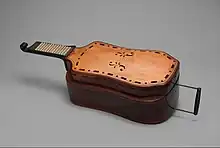
A mélophone with its lid on from the collection of the Metropolitan Museum of Art
The mélophone is a portable free reed instrument first constructed by Parisian watchmaker Pierre Charles Leclerc in 1837.[1] After persuasion from Leclerc, composer Fromental Halévy included the instrument in his 1838 opera, Guido et Ginevra and briefly popularized the instrument.[2] However, by 1855, the novelty had worn off and the instrument faded into relative obscurity.[3]
References
- ↑ Libin, Laurence (2015). "Mélophone". The Grove Dictionary of Musical Instruments (2nd ed.). Oxford University Press. doi:10.1093/acref/9780199743391.001.0001. ISBN 978-0-19-974339-1.
- ↑ Lavoix, Henri Marie François (1878). Histoire de L'instrumentation: Depuis le Seizième Siècle Jusqu'à Nos Jours (in French). Firmin Didot. p. 155. OCLC 751505.
- ↑ Snoeck, Cesar Charles (1894). Catalogue de la Collection D'instruments de Musique Anciens ou Curieux (in French). Vuylsteke. p. 18. OCLC 902879877.
External links
 Media related to Mélophone at Wikimedia Commons
Media related to Mélophone at Wikimedia Commons- Details from the Metropolitan Museum of Art
This article is issued from Wikipedia. The text is licensed under Creative Commons - Attribution - Sharealike. Additional terms may apply for the media files.